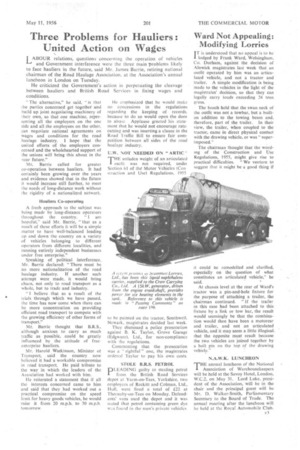Three Problems for Hauliers: United Action on Wages
Page 49

If you've noticed an error in this article please click here to report it so we can fix it.
LABOUR relations, questions concerning the operation of vehicles
and Government interference were the three main problems likely to face hauliers in the future, said Mr. James Barrie, retiring national chairman of the Road Haulage Association, at the Association's annual luncheon in London on Tuesday.
He criticized the Government's action in perpetuating the cleavage between hauliers and British Road Services in fixing wages and conditions.
"The alternative," he said, " is that the parties concerned get together and build up joint negotiating machinery of their own, so that one machine, repre' renting all the employers on the one side and all the employees on the other, can negotiate national agreements on wages and conditions for the road haulage industry. I hope that the united efforts of the employers concerned and the wholehearted support of the unions will bring this about in the near future,"
Mr. Barrie called for greater co-operation between hauliers. It had certainly been growing over the years and evidence showed that in the future it would increase still further, to meet the needs of long-distance work without the rigidity of a nationalized network.
Hauliers Co-operating A fresh approach to the subject was being made by long-distance operators throughout the country. "I am hopeful," said Mr. Barrie, "that as a result of these efforts it will be a simple matter to have well-balanced loading up and down the country on a variety of vehicles belonging to different operators from different localities, and running entirely independent businesses under free enterprise."
Speaking of political interference, Mr. Barrie declared: "There must be no more nationalization of the road haulage industry. If another such attempt were made, it would bring chaos, not only to road transport as a whole, but to trade and industry.
" I believe that as a result of the trials through which we have passed, the time has now come when there can he more concentration on providing efficient road transport to compete with the growing efficiency of other forms of transport."
Mr. Barrie thought that B.R.S., although anxious to carry as much traffic as possible, could be greatly influenced by the attitude of freeenterprise hauliers.
Mr. Harold Watkinson, Minister ot Transport, said the country now believed it had a workable compromise in road transport. He paid tribute to the way in which the leaders of the Association had worked with him.
He reiterated a statement that if all the interests concerned came to him and said that they had worked out a practical compromise on the speed limit for heavy goods vehicles, he would raise it from 20 m.p.h. to 30 m.p.h. tomorrow. He emphasized that he would make no concessions in the regulations regarding the keeping of records. because to do so would open the door to abuse Applause greeted his stateinent that he would not encourage ratecutting and was inserting a clause in the Road Traffic Bill to ensure fair competition between all sides of the road haulage industry.
U.W. NOT NEEDED ON " ARTIC T'HE unladen weight of an articulated 1 outfit was not required, under Section 61 of the Motor Vehicles (Con struction and Use Regulations, 1955
to he painted on the tractor, Southwell, Newark, magistrates decided last week.
They dismissed a police prosecution against B. K. Taylor, Grove Garage (Edgware), Ltd., for non-compliance with the regulations.
Commenting that the prosecution was a " rightful " one, the magistrates ordered Taylor to pay his own costs.
STOLE B.R.S. PETROL
PLEADING guilty to stealing petrol from the British Road Services depot at Yarm-on-Tees, Yorkshire, two employees of Reekitt and Colman, Ltd., Hull, were lined a total of £22 at Thornaby-on-Tees-on Monday. Defendants' vans used the depot and it was stated that petrol containing green dye was found in the men's private vehicles.




























































































































